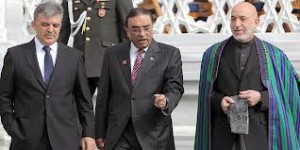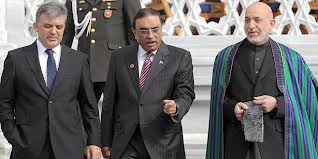
Kabul/Islamabad, Dec 13: Afghan officials say Pakistan has released a new batch of Taliban prisoners, in the latest of a series of concessions to Kabul that could signal greater Pakistani support for a peace deal in Afghanistan.
According to sources in Kabul, Pakistan released nine middle-ranking Taliban commanders, making a total of 18 such prisoners let out of Pakistani jails since last month. Afghan and western officials said most of the Taliban prisoners had been arrested because they had shown interest in making peace, without the permission of the Pakistani military, which has long seen its backing for the insurgents as a strategic bargaining chip.
The prisoner releases come amid a flurry of bilateral meetings and a significant warming in the Afghan-Pakistan relationship, which is almost universally seen as critical to hopes of peaceful settlement in the 11-year Afghan conflict.
Afghanistan’s President Hamid Karzai and his Pakistani counterpart, Asif Ali Zardari, met in Ankara on Wednesday. The outcome of the meeting has not been revealed other than an agreement to conduct a joint investigation into an assassination attempt last week against Asadullah Khalid, the head of Afghan intelligence.
A hotline has also been established between the leaders of Afghanistan, Pakistan and Turkey. The Ankara summit followed a meeting of security officials in London on 5 December, and a visit to Pakistan by Afghanistan’s high peace council last month.
The head of the council’s executive, Masoom Stanekzai, said: “You can see two things. One is there is a change of language. Second is they are taking some practical steps.”
He added that the prisoner releases “sent a positive message in terms of building confidence both among the public and with the Taliban”.
Another Afghan official, speaking off the record, said: “If Pakistan co-operates, there could be a major breakthrough in 2013, and that means a sustained period of face-to-face negotiations, and a ceasefire leading to Taliban participation in the [2014] election.”
However, there is still significant scepticism about Pakistan’s motives in Kabul and western capitals, which for years have accused it of stoking the insurgency while paying lip service to peace. “We don’t yet know if this is a tactical or strategic shift,” an Afghan official said.
Pakistan has still not released its most senior Taliban prisoners, most importantly the former second in command, Mullah Abdul Ghani Baradar, who Kabul believes could be a key participant in any future peace talks. The Pakistani foreign minister, Hina Rabbani Khar, said on Wednesday that it was still too early to discuss Baradar’s release but that Pakistan would continue to release Taliban inmates.
Afghan officials would also prefer to have had a chance to talk to the Taliban prisoners on their release, but they were instead allowed to disperse. Most are thought to have gone back to their families in Pakistan, though one mid-level official is said to have gone to Saudi Arabia, where he has family, and there were unconfirmed reports that at least one had returned to the fight in Afghanistan and another had been re-arrested.
“The litmus test is the insurgency and that has continued unabated,” said one doubtful western expert on the Taliban. “There is no sign that they have reined in these guys because they still think they are their best asset to get the government in Kabul that they want.”
Optimists inside the Karzai government insist that such views do not take into account the dramatically different atmosphere in the most recent talks. They believe there that is now substantial evidence that Pakistan is taking a new view of its long-term interests and preparing for the possibility of the success of an Afghan settlement rather than its failure. They say the Pakistani leadership appears less preoccupied by the longstanding fear that Afghanistan could become an Indian client state that would contribute to Pakistan’s encirclement.
“That is a real change. They didn’t even mention India,” said a participant in recent talks. “They didn’t ask for India to close its consulates. They didn’t talk about their need for a ‘friendly’ Afghanistan. They said they needed a stable Afghanistan.”
He said Pakistan had made further concessions, agreeing to guarantee safe passage to a Taliban delegation to forthcoming informal talks in Chantilly, outside Paris. The Afghan and Pakistani leadership have also discussed deepening military co-ordination. Stanekzai said that there was agreement to organise a joint meeting of Afghan and Pakistani Islamic clerics early in the new year, focused on “how to change the narrative of violence to a narrative of peace”.
Stanekzai would not comment on reports that Afghan officials had visited Baradar in jail in Pakistan, but US officials said that at least one such meeting took place. It is also believed that senior Taliban inmates in Pakistan have been placed under a more liberal regime, such as being allowed to make telephone calls under supervision.
In light of Pakistan’s more positive approach, Stanekzai said, Kabul was determined that last week’s assassination attempt against its national security director would not derail the improvement in the bilateral relationship, although Afghanistan had evidence that the would-be killer – who hid explosives in his underpants – came from Quetta in Pakistan.
“No doubt there are enemies of the peace [process] everywhere and they don’t want this reconciliation to move forward, people who benefit from the continuation of conflict and war,” he said. “They will always create obstacles in order to prevent it, and every time we make some progress there is an incident that happens”
He also called on the Obama administration to release Taliban commanders from Guantánamo Bay, so they could take part in a peace process that began and then stalled in Qatar earlier this year. The release of five Taliban inmates has been delayed because of a lack of agreement between the US and the insurgent leadership on guarantees that they would not re-enter the conflict.
“We do hope that issue is resolved quickly, as this can be a step forward,” Stanekzai said, adding that in return, the Taliban would have to commit to direct peace talks and a ceasefire. He said: “In negotiation and peace talks, you have to give something and you have to get something.”

